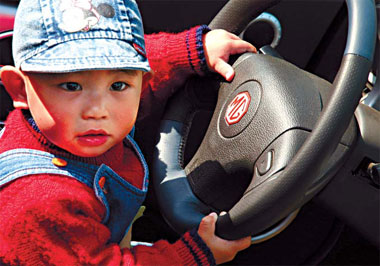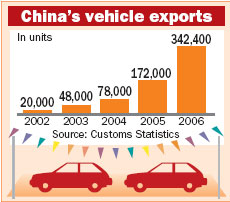

 After the international success of a host of goods ranging from clothes to home appliances, "Made in China" has found a new engine or rather, a car.
After the international success of a host of goods ranging from clothes to home appliances, "Made in China" has found a new engine or rather, a car.
Chinese carmakers are aggressively making inroads into the international arena by sending shiploads of vehicles and building plants abroad. Priced low, they appear to be an instant hit as exports are rising fast.
A little too fast, say industry officials and analysts, who warn of a rocky road ahead and the danger of pressing on the gas without a clear roadmap.
One of the reasons Chinese cars manage to sell so cheap abroad is their cut-throat competition at home that translates into price wars in the global market.
On March 1, the government began to implement auto export licensing regulations to prevent such unhealthy price wars and weed out the players who are too small to compete internationally. As a result of this move, half of the 1,000-odd Chinese vehicle exporters will be barred from selling their wares in foreign markets.
"We cannot sell vehicles in the overseas market like radish and cabbage. The overseas market must be put in order," says Zhang Ji, an official from the Ministry of Commerce.
China's vehicle exports doubled to 342,400 units last year from 2005, with that of passenger cars tripling to more than 90,000 units, according to industry data.
Home-grown companies have chalked out ambitious plans to sell cars abroad, with many targeting the United States, the world's biggest auto market.
 Rough ride
Rough ride
Geely Automobile, the low-cost car producer based in Zhejiang Province, plans to sell 2 million vehicles a year by 2015, with two-thirds of its products slotted for the overseas market.
Li Shufu, Geely's chairman, is confident that his company will, and must, achieve this goal.
"It's only by selling a yearly volume of 2 million units can a carmaker survive global competition. We'll be able to achieve it and emerge as global leaders, just as China-made garments and home appliances have done before us."
But his target is almost mission impossible as the privately owned firm's overall sales reached 200,000 units last year, with only 7,000 sold abroad.
While making its debut in the 2006 Detroit motor show, Geely announced that it will enter the US market with a 1.6-liter Freedom Cruiser compact sedan in 2008. But Geely executives say the plan has been postponed to 2010 as there's "a lot to do" for the company to meet US standards.
Chery Automobile, another Chinese auto giant, clinched a deal with US firm Visionary Vehicles LLC at the end of 2004 to ship its cars to the US from this year. But it was jolted out of its great American dream as Visionary Vehicles pulled out of the deal.
Late last year, Chery cut a deal with struggling US carmaker Chrysler to make small cars under the latter's badges in China for US and European markets. But there are uncertainties over this plan, too, as DaimlerChrysler is set to sell the loss-making Chrysler.
Brilliance China Auto, partner of German premium carmaker BMW, says it is in talks with companies in the US to sell cars there.
Changfeng Group, a Chinese sport utility vehicle (SUV) maker in Hunan Province, also plans a foray into the US market within two to three years. It has just made its debut in the Detroit auto show in January.
All that's far too much activity, according to Jia Xinguang, an independent auto analyst based in Beijing. "Chinese carmakers must have top-flight product quality. Otherwise, they will be punished by American customers," Jia warns.
Domestic producers, Jia says, should take lessons from the Yugo fiasco. The brand, from erstwhile Yugoslavia, was introduced in the US in 1985 by Malcom Bricklin, chairman of Visionary Vehicles. But it had to make an unceremonious exit in 1992 as a result of huge problems with performance, safety and services.
Made in, not China
A battery of Chinese automakers is raring to build plants abroad, which - in theory - is a swift way to boost overseas sales. But then there's protectionism to deal with in foreign markets.
Geely had made a deal with a Malaysian partner in 2005 to assemble its cars in the Southeast Asian nation from this year. But the project has been suspended after Malaysia demanded that Geely sell four-fifths of locally made cars out of the country.
"The restriction is unfair. But it will take time to sort out the problem," says Wang Ziliang, a Geely spokesman.
Analysts say Malaysia's barrier against Geely is aimed to protect its own brands such as Proton and Perodua.
Nanjing Automobile Corp, partner of Italian carmaker Fiat Auto, had announced in July that it will produce cars under the acquired British brand ?MG ?in the United States next year. Top executives of the company say it is negotiating with several US investors for the project.
But eyebrows have been raised at the project. Zhang Xin, from Guotai & Jun'an Securities in Beijing, says Nanjing Automobile ?which has been in the red for many years ?should pool its MG efforts at home, instead of building a plant in the US.
MG car production kicked off last month in the eastern Chinese city of Nanjing, the company's home base.
Echoing Zhang Xin's views, Yale Zhang, director of Greater China Vehicle Forecasts for CSM Worldwide (Shanghai) Ltd, says: "They should do abroad only what matches their capability."
Chery has built six plants in Iran, Indonesia, Egypt, Ukraine, Russia and Uruguay. Brilliance has also set up factories in Egypt and the Democratic People's Republic of Korea.
(China Daily 04/23/2007 page1)













